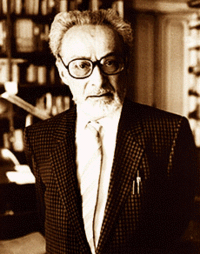If This Is a Man
 Original first edition cover | |
| Author | Primo Levi |
|---|---|
| Original title | Se questo è un uomo |
| Translator | Stuart Woolf |
| Country | Italy |
| Language | Italian |
| Genre | Memoir |
| Publisher |
De Silva (Italian) Einaudi (Italian) The Orion Press (English) |
Publication date | 1947 |
Published in English | 1959 |
| Pages | 179 pp |
If This Is a Man (first published in 1947 in Italian as Se questo è un uomo [se ˈkkweːst(o) ɛ un ˈwɔːmo]; United States title: Survival in Auschwitz) is a work by the Italian Jewish writer Primo Levi. It describes his arrest as a member of the Italian anti-fascist resistance during the Second World War, and his incarceration in the Auschwitz concentration camp from February 1944 until the camp was liberated on January 27, 1945.
Publication
The first manuscript for Se questo è un uomo was completed by Levi in December 1946. In January 1947, the manuscript was rejected by Einaudi. Levi managed to find a smaller publisher, De Silva,[1] who printed 2,500 copies of the book, 1,500 of which were sold, mostly in his home town of Turin. In 1957, Einaudi agreed to reprint it, and interest in it increased.[1]
An English translation by Stuart Woolf was published in 1959, and a German translation by Heinz Reidt appeared in 1961, titled Ist das ein Mensch?, as was a French edition.[1] All translations were completed under the supervision of Levi. He was particularly careful to oversee the German translation, writing in The Drowned and the Saved:
I did not trust my German publisher. I wrote him an almost insolent letter: I warned him not to remove or change a single word in the text, and I insisted that he send me the manuscript of the translation in batches ... I wanted to check on not merely its lexical but also its inner faithfulness.[2]
Robert S. C. Gordon writes that Levi went on to develop a close relationship with Reidt.[3] The German edition contains a special preface addressed to the German people, which Levi said he wrote out of passionate necessity to remind them what they had done.[4]
If This Is a Man is often published with Levi's second work of witness, The Truce (Italian title: La Tregua).
Invocation
The book is introduced by a poem. The curious construction "If .." invites the reader to make a judgement. It alludes to the treatment of people as Untermenschen (German for "sub-human"), and to Levi's examination of the degree to which it was possible for a prisoner in Auschwitz to retain his or her humanity. The poem explains the title and sets the theme of the book: humanity in the midst of inhumanity.
The last part of the poem, beginning "meditate," explains Levi's purpose in having written it: to record what happened so that later generations will ponder (a more literal translation of meditare) the significance of the events he lived through. It also parallels the language of the V'ahavta, the Jewish prayer that commands followers to remember and pass on the teachings of their faith.
|
|
|
See also
- Le Monde's 100 Books of the Century
- Night (book)
- The Diary of a Young Girl
- The Holocaust in popular culture
Notes
- ↑ 1.0 1.1 1.2 Levi, Primo. Note to the Theatre version of If This Is a Man, pp. 23–25.
- ↑ The Drowned and the Saved, p. 139, cited in Gordon 2007, p. 157.
- ↑ Gordon 2007, p. 157.
- ↑ The Drowned and the Saved (Italian title: I Sommersi e i Salvati)
References
- Benchouiha, Lucie (2006). Primo Levi: Rewriting the Holocaust. Troubador Publishing Ltd. ISBN 1-905237-23-5
- Gordon, Robert S. C. (2007). The Cambridge Companion to Primo Levi. Cambridge University Press. ISBN 0-521-84357-X
Further reading
- Alford, Frederick (31 May 2009). After the Holocaust: Primo Levi, The Book of Job, and the Path to Affliction. Cambridge University Press. ISBN 0-521-74706-6.
- Patruno, Nicholas (2008). Understanding Primo Levi. University of South Carolina Press. ISBN 1-57003-791-4.
- Pugliese, Stanislao G. (2004). The Legacy of Primo Levi. Palgrave Macmillan. ISBN 1-4039-6645-1.
- Farrell, Joseph (2004). Primo Levi: The Austere Humanist. Verlag Peter Lang. ISBN 3-03910-069-6.
- Thomson, Ian (2003). Primo Levi: A Biography. Vintage. ISBN 0-09-951521-0.
- Angier, Carole (2003). The Double Bond: Primo Levi, a Biography. Penguin Books Ltd. ISBN 0-14-016587-8.
- Kremer, Roberta S. (2001). Memory and Mastery: Primo Levi as Writer and Witnes. State University of New York Press. ISBN 0-7914-4922-X.
- Anissimov, Myriam (2000). Primo Levi: Tragedy of an Optimist. Overlook Press. ISBN 1-58567-020-0.
- Cicioni, Mirna (1995). Primo Levi: Bridges of Knowledge. Berg Publishers. ISBN 1-85973-063-9.
- Camon, Ferdinando (1991). Conversations with Primo Levi. The Marlboro Press. ISBN 0-910395-48-9.
- Vincenti, Fiora (1981). Primo Levi. Milan: Mursia.
| ||||||||||||||||||||||||||
